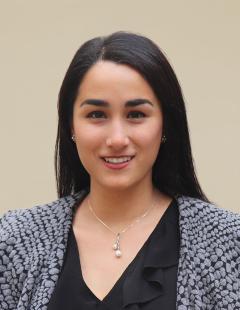Alessandra Enrico
Tell us about your background
I'm from Peru, and I studied law and am affiliated with the Lima bar association. As my specialisation was in Public International Law and International Human rights Law, I also completed an MSc in Human Rights at PUCP University in Peru. Prior to pursuing my MSc in Migration Studies, I held various positions, such as a researcher at the Institute for Democracy and Human Rights at PUCP University, an eligibility officer for asylum claims at the Ministry of Foreign Affairs in Peru, a legal associate at UNHCR, and in recent years legal consultant for IOM.

“I really appreciated ODID's extra-curricular offer, which included a wide range of events, seminars, lectures and other academic activities throughout the term.”
“I really appreciated ODID's extra-curricular offer, which included a wide range of events, seminars, lectures and other academic activities throughout the term.”
What made you choose to study at ODID?
I was looking to broaden my understanding of migration and refugee law beyond the scope of law and public policy, which is my area of expertise. My goal was to gain new tools to understand and be able to delve deeper into the current conversations and debates surrounding migration. I consider this programme effectively integrates both the theoretical and practical aspects of migration. Courses such as Governance, Migration and the Economy, Anthropology, Time and Temporalities, and Policy and Migration have been highly stimulating and have opened up new ways of approaching this phenomenon.
What do you particularly like about ODID?
In particular, I found the ODID community to be a very stimulating space that brings together academics, professors, researchers, and students interested in ongoing discussions about migration and its various perspectives and intersections. I really appreciated ODID's extra-curricular offer, which included a wide range of events, seminars, lectures and other academic activities throughout the term. This allowed students not only to keep up with their academic duties but also to engage in a wide range of discussions on various topics and contexts beyond migration, broaden their academic connections and exchange views with other scholars who are always willing to support and discuss your ideas.
What do you particularly like about your course of study?
I really appreciated how professors showed genuine empathy towards my research topic and academic interests. They were always eager to chat with you, review your academic work and give you suggestions on how to explore different avenues and approaches. Also, I enjoyed the thought-provoking discussions during the seminars. Having the opportunity to exchange ideas or listen to the experiences of classmates from different academic, professional and geographical backgrounds was an excellent chance to learn and value other perspectives.
What did you research for your dissertation?
My dissertation focused on Venezuelans' perceptions of available legal statuses and complementary pathways in Colombia, Peru and Ecuador. Drawing on semi-structured interviews with 18 participants from the Venezuelan diaspora, civil society organisations, UN agencies (UNHCR and IOM) and government officials, my research captured multiple perspectives on Venezuelan regularisation dynamics. It examined how they navigated uncertain bureaucratic processes, negotiated their legal status, and made decisions regarding their integration and prospects. By giving voice to migrants' perspectives, the study shed light on their agency, obstacles, and aspirations within the complex legal mechanisms. One of the key findings was the clash between political narratives about the benefits of regularisation and the current complex relationship of Venezuelans to legal statuses and complementary pathways in the Andean countries.
What other activities have you been involved with at Oxford?
I volunteered at the Collaborative Legal Aid Clinic for Immigration Law run by the Bonavero Institute of Human Rights and Turpin Miller solicitors. The project's main aim was to provide legal support to detainees at HMP Huntercombe Prison in Oxford. I had the opportunity to visit HMP with other students from various MSc and DPhil programmes at Oxford to conduct interviews with the detainees and evaluate the extent to which the project could provide legal assistance. I also had the opportunity to assist with some cases in Turpin Miller's office, which I found to be an enriching and fascinating experience. It gave me an insight into the UK immigration system.
Is life at Oxford different from how you expected it to be?
Not really. People both at the university and in the city are friendly and kind, and the city is quiet and ideal for handling academic duties with my family life.
What advice would you give to someone thinking of applying?
If you're considering doing an MSc in Migration Studies, I would advise setting your interests beforehand – whether you aim to stay in academia, work, or combine both, as I did. This would be useful for choosing your electives, finding out what interests you most, and suggesting a dissertation topic that excites you. Another advice is to enjoy Oxford as a whole beyond your academic studies. Getting involved in non-academic activities greatly expands your overall experience and balances your academic life with other activities.
